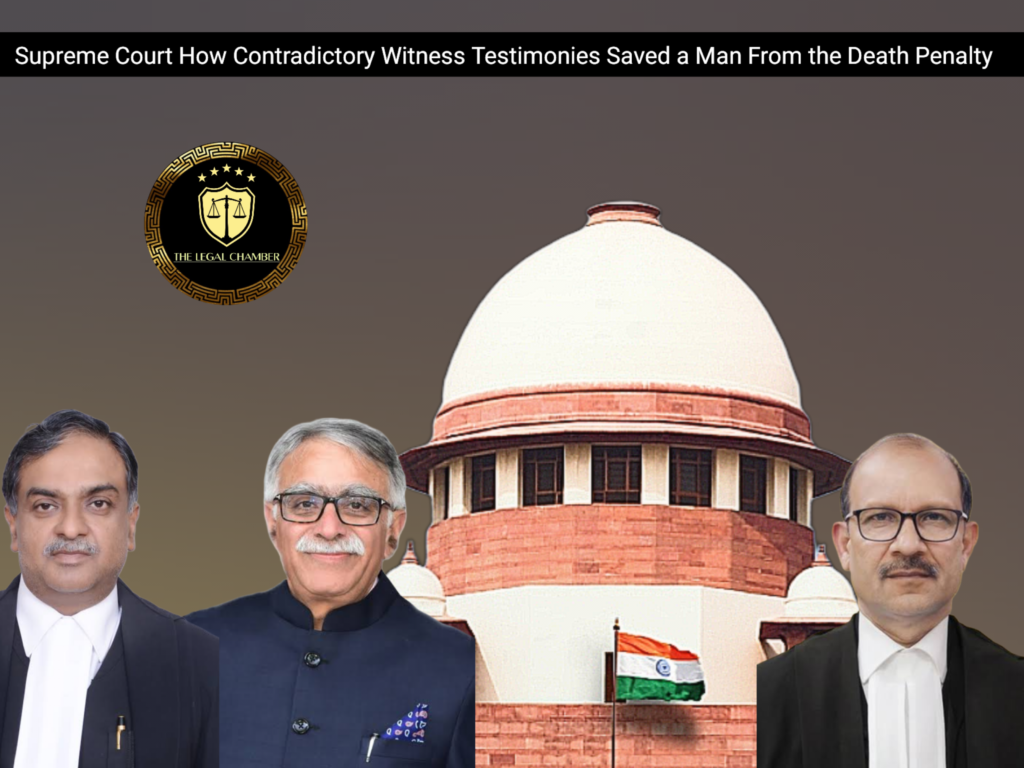
The Supreme Court acquitted the appellant, overturning his death sentence, due to glaring inconsistencies in eyewitness testimonies (PW1, PW2) and lack of corroborative evidence. The prosecution failed to prove guilt beyond reasonable doubt, as recoveries were unreliable, forensic links were absent, and material contradictions undermined the case. The Court emphasized strict adherence to evidentiary standards in capital offenses.
Facts Of The Case:
The case involves the brutal murder of four family members—Seema Rani (the appellant’s wife), Reena Rani (sister-in-law), and two minor children, Sumani Kumari (3-4 years) and Harsh (1.5-2 years)—along with injuries to two others, Harry (5 years) and Om Prakash (18 years). The incident occurred on November 29, 2013, in the early morning at the house of PW2-Manjit Kaur, the appellant’s mother-in-law. The prosecution alleged that the appellant, Baljinder Kumar, committed the murders due to a financial dispute involving Rs. 35,000/- related to his sister’s divorce, where PW2 stood as a guarantor. The FIR was registered based on the statement of PW1-Vijay Kumar (complainant), who claimed to have seen the appellant fleeing with a weapon. The Trial Court convicted the appellant under Sections 302, 308, and 325 of the IPC, sentencing him to death, which the High Court upheld. However, the Supreme Court found major contradictions in the testimonies of key witnesses (PW1, PW2, and PW17), lack of independent witnesses, and investigative lapses, including delayed recoveries and unverified forensic evidence. The Court ruled that the prosecution failed to establish guilt beyond reasonable doubt, leading to the appellant’s acquittal after 11 years in custody.
Procedural History:
The case began with the registration of FIR No. 54/2013 on November 29, 2013, under Sections 302, 323, and 34 of the IPC at Police Station Satnampura, Kapurthala. After investigation, the case was committed to the Sessions Court, where the accused pleaded not guilty. The Trial Court (Additional Sessions Judge, Kapurthala) convicted the appellant on February 29, 2020, under Sections 302, 308, and 325 IPC, imposing the death penalty. The conviction was upheld by the Punjab & Haryana High Court on March 4, 2024, in Criminal Appeal No. 323 of 2020. The appellant then approached the Supreme Court, filing Criminal Appeal Nos. 2688-2689 of 2024. On July 16, 2025, the Supreme Court overturned the lower courts’ decisions, acquitting the appellant due to material contradictions in witness testimonies, unreliable recoveries, and lack of forensic corroboration. The Court ordered the appellant’s immediate release after 11 years of incarceration, unless required in any other case.
READ ALSO :Supreme Court Restores Ejectment Decree: ‘ND’ Postal Endorsement Doesn’t Invalidate Notice Under Transfer of Property Act
Court Observation:
The Supreme Court made critical observations while overturning the conviction, noting that the prosecution’s case suffered from fatal inconsistencies. The Court highlighted that the testimonies of key witnesses (PW1, PW2, and PW17) contained irreconcilable contradictions regarding the appellant’s presence, weapon used, and sequence of events. It emphasized that the Trial Court and High Court erred in dismissing these discrepancies as “minor” when they fundamentally undermined the prosecution’s narrative. The Court found the alleged recoveries of blood-stained clothes and weapons unreliable due to the absence of independent witnesses and unexplained delays. It noted the prosecution’s failure to conduct proper forensic analysis to link these items conclusively to the crime. Significantly, the Court rejected the application of Section 106 of the Evidence Act to presume guilt from the appellant’s unexplained injuries, stressing that foundational facts must first be established. Observing that the prosecution failed to meet the “beyond reasonable doubt” standard in a death penalty case, the Court underscored that deficiencies in investigation and contradictory evidence create a “gaping hole” in the case. The judgment reaffirmed that mere absence of alternative explanations cannot substitute for positive proof of guilt in capital offenses.
Final Decision & Judgement:
In its final judgment dated July 16, 2025, the Supreme Court of India allowed the criminal appeals and acquitted the appellant, Baljinder Kumar @ Kala, setting aside his death sentence and convictions under Sections 302, 308, and 325 of the IPC. The Court held that the prosecution failed to prove guilt beyond reasonable doubt due to material contradictions in witness testimonies, unreliable recoveries, and lack of forensic corroboration. Emphasizing the strict evidentiary standards required in capital cases, the Bench ruled that the Trial Court and High Court erred in relying on inconsistent and uncorroborated evidence. The Court ordered the immediate release of the appellant after 11 years of incarceration, unless detained in any other case. The judgment reinforced the principle that mere suspicion, however strong, cannot substitute for legal proof in criminal trials, especially where the death penalty is involved.
Case Details:
Case Title:Baljinder Kumar @ Kala vs. State of Punjab Citation:2025 INSC 856 Criminal Appeal No.:Criminal Appeal Nos. 2688-2689 of 2024 Date of Judgment:July 16, 2025 Judges/Justice Name: Justice Vikram Nath & Justice Sanjay Karol & Justice Sandeep Mehta
Download The Judgement Here